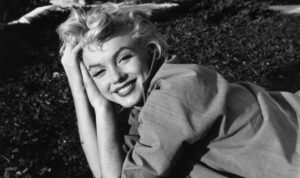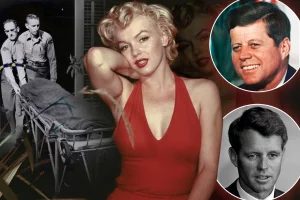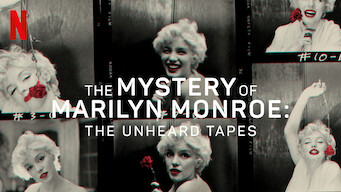While knowing very little about Netflix’s most recent documentary on Marilyn Monroe, I was still very interested in seeing it. Like many, I find Miss Monroe to be ever-beautiful and somehow elusive. She remains a mystery in death, a tragic hero. While many people have been curious about how she lived, an ever growing number are interested in how she died. True crime series and documentaries are more popular than ever before. It’s excavation, a digging up of the dirt quite literally and seeing what we’ve missed and what time and technological advances can add to the story of one’s life.
The Mystery of Marilyn Monroe: The Unheard Tapes presents a collection of interviews never heard by the public before, 650 to be exact, that were conducted by journalist Anthony Summers in 1982, twenty years after Miss Monroe’s passing. At the time, there was a police re-investigation into the cause of her death. Rumors had persisted through the years as to whether her demise was accidental, suicide or as the interviewer states “something more sinister.”
The documentary clearly favors the sinister part. There’s a bluesy noir feel to the film that emphasizes the “mystery” in its title. Scribbled headers introduce audio tapes of former agents, filmmakers, those who knew Marilyn and Marilyn herself. We learn some cynical yet factual truths of the movie business. Primarily how younger women like Marilyn had to sleep with male executives in order to get roles. An agent named Al Rosen cites ‘black books’ and sex as a type of currency for that time period while today it’s ‘the buck’ that decides who gets casted. One may think of misogynist Harvey Weinstein and can draw a straight line from that early criminal activity to now.

All of the interviews are subtitled and the voices are lip-synced by actors that appear on screen, an odd choice that feels kind of silly to start with. But as the film progresses, you sort of get used to it. Stock footage, interviews and photographs make up most of the movie. We follow Marilyn’s rise to fame, starting with her big break in the John Huston film Asphalt Jungle. And we get to hear Mr. Huston in his own words describe the ‘truth’ in Marilyn’s acting, something ‘deeply moving’ about her. Actress Jane Russell, her co-star in Gentlemen Prefer Blondes describes her as bright and recounts how Marilyn would go straight to an acting coach after a day on set because “she wanted to learn.” As the film progresses, it kind of loses track of this portrayal of Marilyn as poised and in control of her life. There is no denying the fact that she was a successful woman that quite cleverly used persona to win adoration from the public. She was smart and well aware of her sex appeal.
Unfortunately, from there a mix of friends and colleagues paint Marilyn as a tormented figure. The tone of The Mystery of Marilyn Monroe: The Unheard Tapes is one of sadness and gloom, emphasizing loss: Marilyn was ‘deprived of childhood,’ someone ‘that could so easily be destroyed.’ Like in many documentaries of Miss Monroe’s life, as an audience we feel like we let her down somehow.
We know about her two brief marriages and how they both ended in divorce. We learn once again that her first husband, former Yankee Joe DiMaggio wanted a domestic wife in Marilyn and would beat her on occasion. The news coverage at the time was very sexist, with one interviewer in the documentary saying “I hear you’re learning to broil a mean steak.’ And we’re told her second husband, the playwright Arthur Miller grew disillusioned with her and labeled her a whore. And it’s during her second marriage that she suffered a miscarriage, a traumatic event in her life that may have left lasting psychological damage.
A full thirty minutes toward the end of the The Mystery of Marilyn Monroe: The Unheard Tapes are devoted mainly to conspiracy theories and speculation disguised as shocking, airtight new testimonies. One example is a few interviewees that discuss her secret romantic relationship with both John and Robert Kennedy and the alleged cover-up that may have taken place the night that she died. I like gossip. I think there’s a place for it in any tale of old (or new) Hollywood. But this film’s main attraction, the unheard tapes, turn out to reveal not much more than what we already know. And the documentary as a whole is not even really attempting to explore anything new.

Love, Marilyn, a film that tracked Marilyn’s life via personal diary entries came out ten years ago and is a much more fascinating, insightful recounting of her life than this picture is. Love, Marilyn added dimension to Miss Monroe, made her a strong and sympathetic character in her own story, gave her agency in her own life. In comparison The Mystery of Marilyn Monroe: The Unheard Tapes is very flat and two-dimensional. We don’t really get a sense of who Marilyn was. Instead the movie is more like a true crime episode that does little to humanize Marilyn or bring clearer understanding to what may have been a pattern of self-destructive behavior.
The film basically says that she was a lost cause from the start. From her beginnings as a foster child all the way to her pill-popping days as an escort to the president. The Mystery of Marilyn Monroe: The Unheard Tapes is partial biography, partial cold-case file and succeeds in neither. For the celebrity fanatics, it’s just another stock profile of the starlet that does little to change your perceptions.

Comments